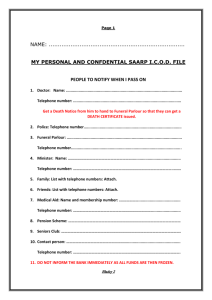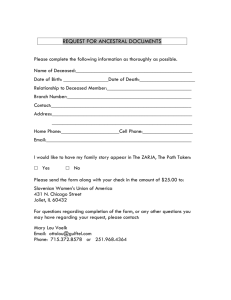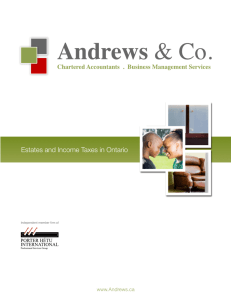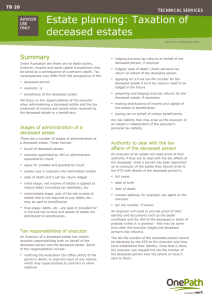Executor Checklist: Estate Administration Guide
advertisement
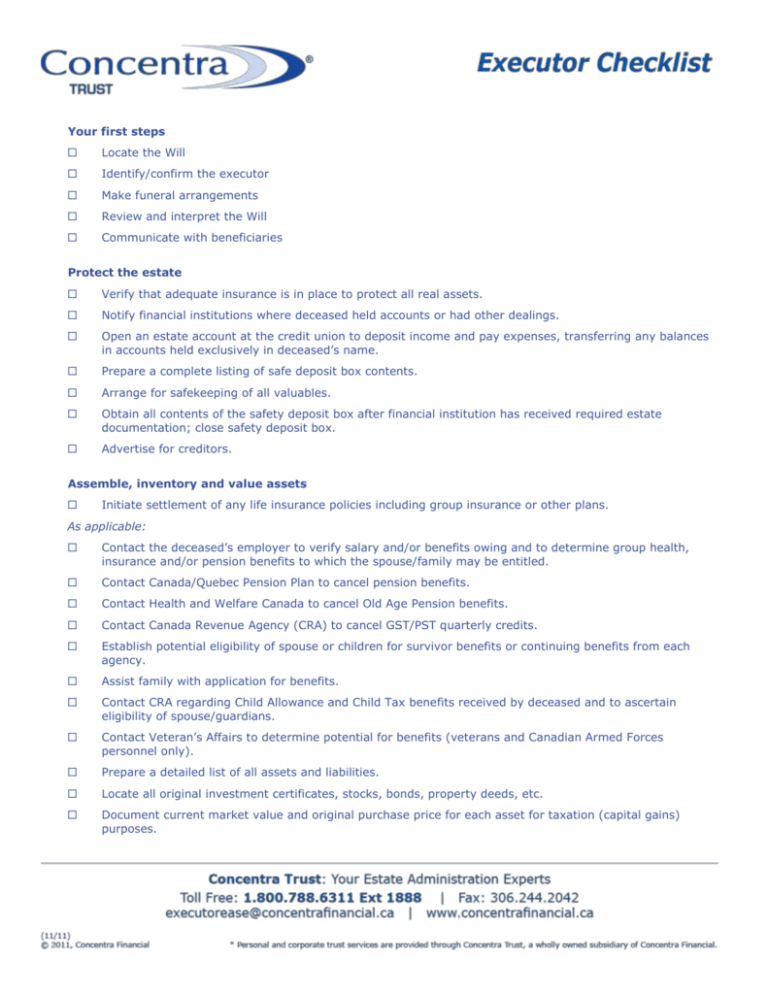
Your first steps Locate the Will Identify/confirm the executor Make funeral arrangements Review and interpret the Will Communicate with beneficiaries Protect the estate Verify that adequate insurance is in place to protect all real assets. Notify financial institutions where deceased held accounts or had other dealings. Open an estate account at the credit union to deposit income and pay expenses, transferring any balances in accounts held exclusively in deceased’s name. Prepare a complete listing of safe deposit box contents. Arrange for safekeeping of all valuables. Obtain all contents of the safety deposit box after financial institution has received required estate documentation; close safety deposit box. Advertise for creditors. Assemble, inventory and value assets Initiate settlement of any life insurance policies including group insurance or other plans. As applicable: Contact the deceased’s employer to verify salary and/or benefits owing and to determine group health, insurance and/or pension benefits to which the spouse/family may be entitled. Contact Canada/Quebec Pension Plan to cancel pension benefits. Contact Health and Welfare Canada to cancel Old Age Pension benefits. Contact Canada Revenue Agency (CRA) to cancel GST/PST quarterly credits. Establish potential eligibility of spouse or children for survivor benefits or continuing benefits from each agency. Assist family with application for benefits. Contact CRA regarding Child Allowance and Child Tax benefits received by deceased and to ascertain eligibility of spouse/guardians. Contact Veteran’s Affairs to determine potential for benefits (veterans and Canadian Armed Forces personnel only). Prepare a detailed list of all assets and liabilities. Locate all original investment certificates, stocks, bonds, property deeds, etc. Document current market value and original purchase price for each asset for taxation (capital gains) purposes. Identify which assets are to be sold, transferred in kind, or have title(s) transferred in accordance with terms of the Will and wishes of beneficiaries. Investigate and pay all debts owed by the deceased, checking with financial institutions for outstanding liabilities. If loan(s) is/are insured, complete appropriate insurance forms. Cancel all credit card accounts and return cards to issuers. Cancel/memorialize social network accounts Probatable estates Consult a professional concerning the probate of the Will. Supply required documents to court. Obtain court documentation attesting to the validity of the Will and confirming you as legal executor. Pay probate fees to provincial government as determined. Administer and distribute estate Return Social Insurance card, passport, driver’s license and health insurance card, if required, obtaining any appropriate refunds. Terminate the deceased’s lease or arrange to have premises sublet. Cancel newspaper and magazine subscriptions; club memberships; telephone, cable TV; Internet services; and gardening and/or snow removal contracts. Re-route mail. Invest any surplus cash until estate is finalized, selecting from allowable investments (contact a trust company, lawyer, accountant or corporate executor for details). Initiate sale of assets, transfer of titles, etc. Begin distributing assets to beneficiaries according to the terms of the Will once it has been probated, ensuring that there are sufficient funds to pay outstanding debts and taxes of the deceased. Advise beneficiary(ies) to consult with a tax advisor to ensure the most tax-advantageous treatment of any registered investments. Assist in establishing any trusts stipulated in the Will. Settle all legitimate claims prior to final distribution of assets, obtaining receipts for any payments made. Obtain a copy of the last tax return filed by deceased. Prepare and file final tax return(s) and returns for international jurisdictions ( i.e. any outstanding returns from previous years if not yet filed). Pay all income taxes owing. Obtain tax clearance certificate(s) from CRA (and/or Revenue Quebec if applicable) once the Notice of Assessment is/are received, confirming that all tax liabilities have been settled. Complete a final tax return for the estate as well as for the deceased’s business, if necessary. Arrange for care or adoption of pets. Arrange for final distribution of remaining assets, obtaining receipts from each beneficiary. Distribute specific bequests (personal belongings) to respective beneficiaries according to the terms of the Will, obtaining receipts. Advise the bank in writing to close the estate account once the estate is settled. Prepare a final accounting of all assets, liabilities, expenses and distribution of assets for beneficiaries. Prepare a report of your expenses (and compensation, if any) as executor. Have each adult beneficiary approve this accounting and sign a release. The above checklist captures only the most common tasks required of an executor. Depending on the complexity of the deceased’s Will, the nature and location of his/her assets, business ventures and the relationships between family members and beneficiaries, additional duties may be required. Please contact us for more information or assistance.
